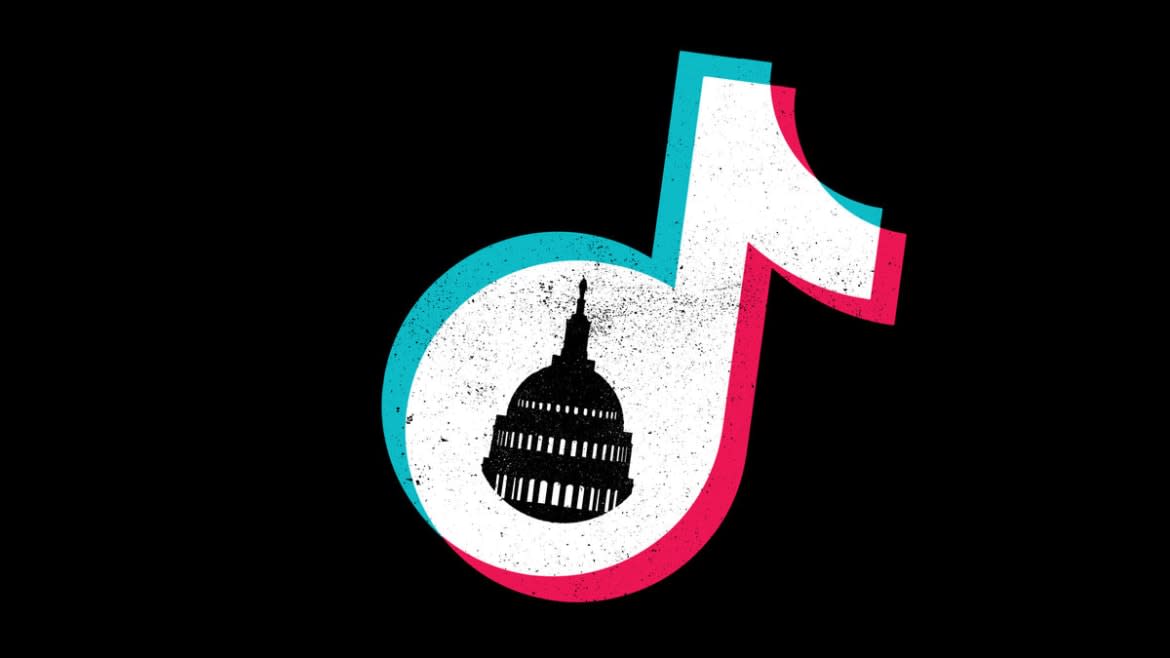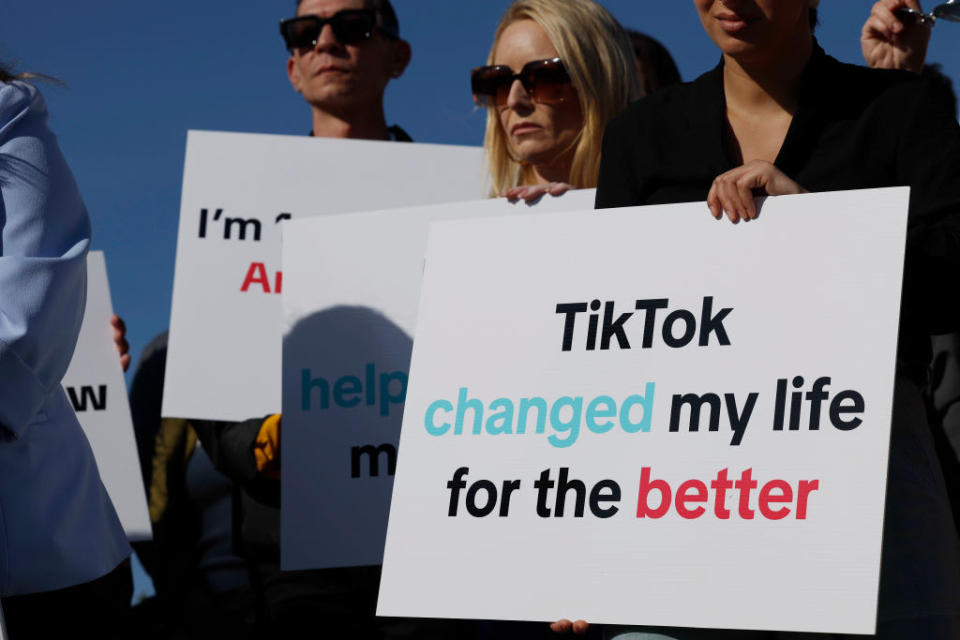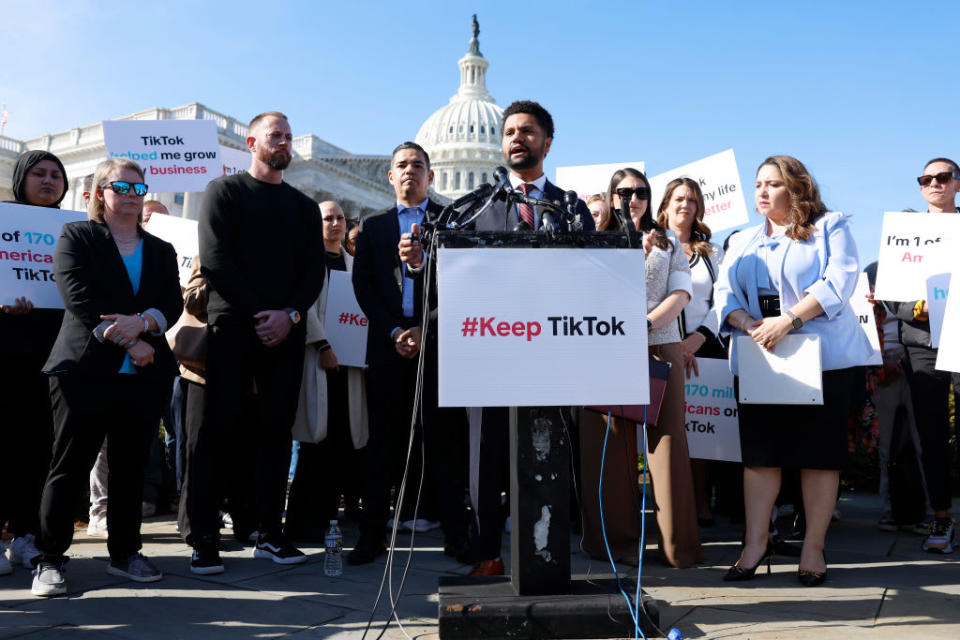Inside Washington’s War Over TikTok

- Oops!Something went wrong.Please try again later.
Like many other offices on Capitol Hill recently, a Republican staffer picked up the phone on Tuesday and was subjected to the tearful pleas of an unlikely constituency.
“Just got a call from a group of crying middle schoolers,” a Republican aide told The Daily Beast, asking that their boss’s name not be identified.
The reason these desperate tweens—in additions to actual teens and senior citizens and many others—are besieging Congress with angry calls is simple: Lawmakers could soon ban from the U.S. TikTok, the Chinese-owned video app they use constantly.
House Committee Passes Bill for ByteDance to Part With TikTok
It’s not just tear-streaked phone calls that lawmakers are facing. On Tuesday, content creators assembled on Capitol Hill begging Congress to save TikTok. At a press conference, dozens waved signs with the phrases “TikTok changed my life for the better” and “#KeepTikTok outside” the U.S. Capitol.
“My voice is on TikTok. My purpose is on TikTok,” J.T. Laybourne—a Utah influencer with 1.7 million followers—told reporters. “We can’t let this happen.”
The legislation in question isn’t exactly an outright ban of TikTok. Instead, it would effectively force the platform’s Chinese parent company, ByteDance, to sell the app to a U.S.-based entity for the platform to be used domestically.
There is considerable bipartisan backing for the bill, which stems from many lawmakers’ concerns over the national security risks of a Chinese-owned company using the platform to potentially conduct surveillance and manipulate the media habits of U.S. citizens.
On Wednesday, the House passed the legislation by a wide bipartisan margin: 352 members voted yes, while 65 voted no. The dissenters included 50 Democrats and 15 Republicans.
The proposal now heads to the U.S. Senate, where it is unclear how Senate Majority Leader Chuck Schumer (D-NY) will handle it.
While President Joe Biden has indicated he would sign the bill into law, TikTok, its lobbyists, and many of its estimated 170 million U.S. users are doing everything in their power to stop that from happening.

Participants hold signs in support of TikTok at a news conference outside the U.S. Capitol Building on March 12.
The aggressive campaign kicked off last week—somewhat controversially—with a feature on the TikTok app that funneled users toward making calls to their congressional representatives to oppose the bill. TikTok CEO Shou Chew even made a personal appearance on Capitol Hill to lobby lawmakers on Tuesday.
According to Rep. Glenn Grothman (R-WI)—whose office was one of many to get inundated with constituent calls about TikTok—the company’s case to lawmakers is simple.
“‘We’re so surveilled today already, it’s not as big a deal as they say,’” Grothman relayed to The Daily Beast.
The flurry of activity has sparked curious bedfellows, expensive lobbying campaigns, and a jarring flip-flop from a one-time critic of TikTok: former President Donald Trump.
The drama has proved a rare display of GOP rebellion against the former president, with many Trump-adoring conservatives enthusiastically supporting the potential ban.
Montana’s TikTok Ban Blocked by Judge: ‘Oversteps State Power’
But on the other side of the Capitol Hill pressure campaign has been a number of competing social media and technology companies, quietly shopping opposition research on TikTok and making the case that the app is a security risk.
In fact, some companies are now pointing out to reporters—without fingerprints—that the European Union has largely given TikTok a pass on oversight and regulation because of the company’s strong lobbying efforts and proposed investments in data centers in Ireland and Denmark.
In the United States, TikTok has been the subject of intense bipartisan scrutiny since the Trump administration threatened to ban the app over concerns that Beijing could access and manipulate data from U.S. users. Under the Biden administration, those worries have continued to mount. In 2022, he signed into law legislation to ban the app from federal government devices.
The years of anti-TikTok rhetoric have turned the platform into a big enough boogeyman that House lawmakers of both parties are prepared to take a dramatic step. If it becomes law, this latest legislative push would put the most extreme restrictions on TikTok to date.
Should the push fizzle out, though, it may not mean there was a groundswell in genuine support for TikTok or that the barrage of constituent calls was decisive. Instead, it may mean that good old fashioned lobbying and Washington factional rivalries were successful in killing yet another piece of legislation.
The competing explanations for why Trump flip-flopped on TikTok illustrate the dynamic. One explanation is that the former president is animated, above all else, by his hatred for Mark Zuckerberg, the CEO of Meta, who he partially blames for his 2020 election defeat.
“If you get rid of TikTok, Facebook and Zuckerschmuck will double their business,” Trump said on Truth Social. “I don’t want Facebook, who cheated in the last Election, doing better. They are a true Enemy of the People!”
Trump-aligned strategists took note when The Washington Post reported in 2022 that Meta tapped Targeted Victory—a major GOP consulting firm launched by alumni of Mitt Romney’s 2012 presidential campaign—to shift negative media attention from Meta to TikTok.
Trump Makes Obnoxious Return to Facebook After 2-Year Ban
One operative in the former president’s orbit told The Daily Beast that many in Trumpworld began questioning whether the push to ban TikTok was born out of genuine concern of Chinese influence, or if it was really a Meta-orchestrated plan to knock a competitor down a peg.
“When we found out the Romney-aligned Targeted Victory was involved in the advocacy of it we started to think ‘What is up?’” the Trump-aligned political operative said, simultaneously airing their camp’s suspicion of anything that has to do with the Utah senator and Trump critic.
But others suggest Trump’s animosity for Zuckerberg does not fully explain his 180-degree turn on TikTok. Trump-aligned operatives also suggest that billionaire conservative megadonor Jeff Yass—a major investor in ByteDance—has been in Trump’s ear.
“Jeff Yass got to Trump,” a source familiar with the matter told The Daily Beast. “I don’t know exactly what they’re expecting to accomplish out of this, but this thing will pass. I get why Trump did it, Yass has promised to dump a lot of money into the presidential race and you gotta do it.”
Even Trump’s former chief strategist Steve Bannon—who supports the House’s TikTok bill—has publicly signaled that Yass and his deep pockets swayed Trump.
After Trump came out in opposition to the bill, Bannon posted a link to a story by Axios—titled “Inside Trump’s TikTok Flip”—to the Gettr social media platform. Bannon captioned it with three words: “Simple: Yass Coin.”
Yass is a major donor to the powerful conservative political organization Club for Growth, which has led the opposition to the TikTok bill.
But Trump denied that Yass ever talked to him directly about TikTok, telling CNBC on Monday that when he spoke with the billionaire during a Club for Growth event in Florida, TikTok did not come up.
However, there is one person who has spoken to Trump about TikTok: Kellyanne Conway.
Club For Growth is paying Conway—a former senior Trump aide—to advocate for TikTok on Capitol Hill as well as conduct surveys of public opinion around the app, though she is not registered as a lobbyist for TikTok.
How This Rookie Congressman Got TikTok Famous
“This is what the polling says good, bad, and ugly,” Conway said, in an interview with The Daily Beast on Tuesday. “I’m a pollster, not a plastic surgeon. I can’t guarantee what your nose will look like. I just perform the surgery and deliver the result. So I had occasion to explain the polling results.”
Despite the high-profile advocacy and lobbying against the TikTok bill, most lawmakers voted in favor of the bill Wednesday. Speaker Mike Johnson (R-LA) and GOP leadership were so confident in the legislation’s success that they used a procedural maneuver that requires two-thirds of the chamber’s support to pass it, which allows them to bypass certain procedural hurdles.
Ultimately, four out of every five House members voted in favor of the bill.
Within the GOP, such defiance of Trump—even among many of his most loyal foot soldiers in Congress—has become a rarity on Capitol Hill. Last week, the TikTok legislation passed out of the House Energy and Commerce Committee unanimously.
To avoid sparking early pushback from lobbyists, the bill’s GOP lead, Rep. Mike Gallagher (R-WI), crafted it as quietly as possible.
Gallagher told The Daily Beast he workshopped the legislation with the Energy and Commerce Committee and the White House for three months until the bill was “ready to roll.”
Now, advocates for TikTok, such as Conway, see the “only play” to stop the bill is in the Senate. She said she has had conversations with senators asking about the political ramifications of voting for the legislation, as well as the underlying constitutionality of it.
As in the House, several hardline Trump supporters are nevertheless supportive of banning TikTok. But unlike in the House, a small group of senators can hold up legislation, and passing it would take at least 60 votes.
“You do have more people sort of calling this into question now than they were before,” she said. “Just, you know, ‘Hey, are we doing it the right way? Are we doing it the China way, of all things?… Are we going to alienate and anger the tens of millions of users who also happen to be our constituents and happen to be our voters?’ So there’s a lot of questions that are being asked.”
While Democrats may loathe figures like Conway, many of them are asking themselves the same questions. Progressives in particular are emerging as a center of opposition to the TikTok legislation.
Rep. Robert Garcia (D-CA), who led the Tuesday press conference featuring content creators, is rounding up Democratic opposition to the TikTok bill. “As an openly gay person, it’s a place where I get so much gay information where gay creators come to share news and let me bring them to Congress,” Garcia told reporters.

Rep. Maxwell Frost (D-FL) speaks at a news conference on TikTok on March 12.
“We should also be honest with each other,” he added. “TikTok is also fun.”
Rep. Maxwell Frost (D-FL)—who is the youngest lawmaker in Congress at 27—is also championing the app as a forum to combat conservative education policies like Florida’s so-called “Don’t Say Gay” law. Frost cited the American Civil Liberties Union, which opposes the TikTok bill on free speech grounds.
“I hear from students all the time that they get their information—the truth of what has happened in this country—from content creators on TikTok,” Frost told reporters.
Other Democrats worry that young voters could blame Biden for a TikTok ban—not exactly a boost for a president struggling with youth voter support in his re-election bid.
“I think it hurts Biden with young people,” Rep. Jamaal Bowman (D-NY)—a TikTok user and opponent of the bill—told The Daily Beast.
Congressional offices have been inundated with calls from young people—some so young that they can’t vote. But if this is their first interaction with politics and Biden and Democrats go along with the GOP effort to ban TikTok, it could be the party of the man in the White House who gets the blame.
TikTok has become an essential part of many teenagers’ lives, and even if the intention of the legislation is just to get the Chinese-owned ByteDance to divest, the optics could be bad enough that lawmakers find themselves facing considerable fallout from a vote that Republican leaders sped through the House.
Still, there’s no telling what might happen to the bill. Sen. Rand Paul (R-KY) is apparently considering a filibuster to block the measure in the Senate, and there is considerable conservative backlash in the House to the TikTok ban—and not just because Club for Growth is opposed to it.
The legislation would actually give the president the power to ban any website controlled by foreign adversaries, not just TikTok, as libertarian-minded Rep. Thomas Massie (R-KY) pointed out on Twitter.
The so-called TikTok ban is a trojan horse.
The President will be given the power to ban WEB SITES, not just Apps.
The person breaking the new law is deemed to be the U.S. (or offshore) INTERNET HOSTING SERVICE or App Store, not the “foreign adversary.”https://t.co/iKtAQFGeQH pic.twitter.com/P26hEbzQrf— Thomas Massie (@RepThomasMassie) March 12, 2024
Free speech concerns have played a core role in past legal fights over TikTok—including one pushed by Trump himself. When he was president, Trump tried to ban the app using an executive order that deemed Beijing-owned apps a national security threat to the U.S. When TikTok sued to block the order, courts agreed that Trump’s action would impinge on free speech rights.
It’s taken as gospel among members of both parties that TikTok is a threat to user data, and federal officials have issued warnings to the public in the past that information like browsing history could be shared with Beijing. But TikTok insists it has never done so.
With the bill expected to pass in the House, TikTok lobbyists have already turned their attention to the Senate, but plenty of key senators have already made up their mind.
Sen. John Fetterman (D-PA)—who used TikTok heavily during his 2022 campaign—said TikTok lobbyists shouldn’t waste their breath trying to convince him to oppose the bill. He told reporters that he firmly supports the legislation due to security concerns, and another reason that’s nagging seemingly everyone on Capitol Hill: tweens.
“I’ve spent hundreds of dollars on Drunk Elephant at Sephora because of my tween and that’s annoying,” he said.
Get the Daily Beast's biggest scoops and scandals delivered right to your inbox. Sign up now.
Stay informed and gain unlimited access to the Daily Beast's unmatched reporting. Subscribe now.

